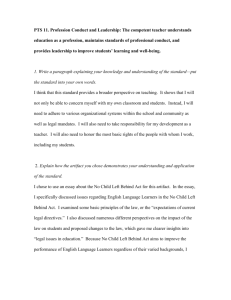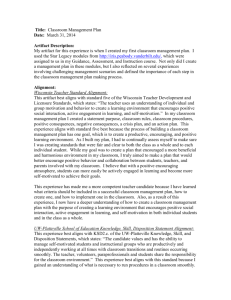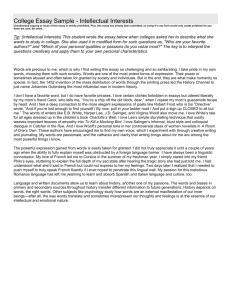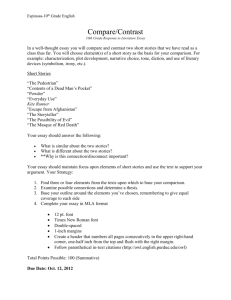Alignment Reflection
advertisement
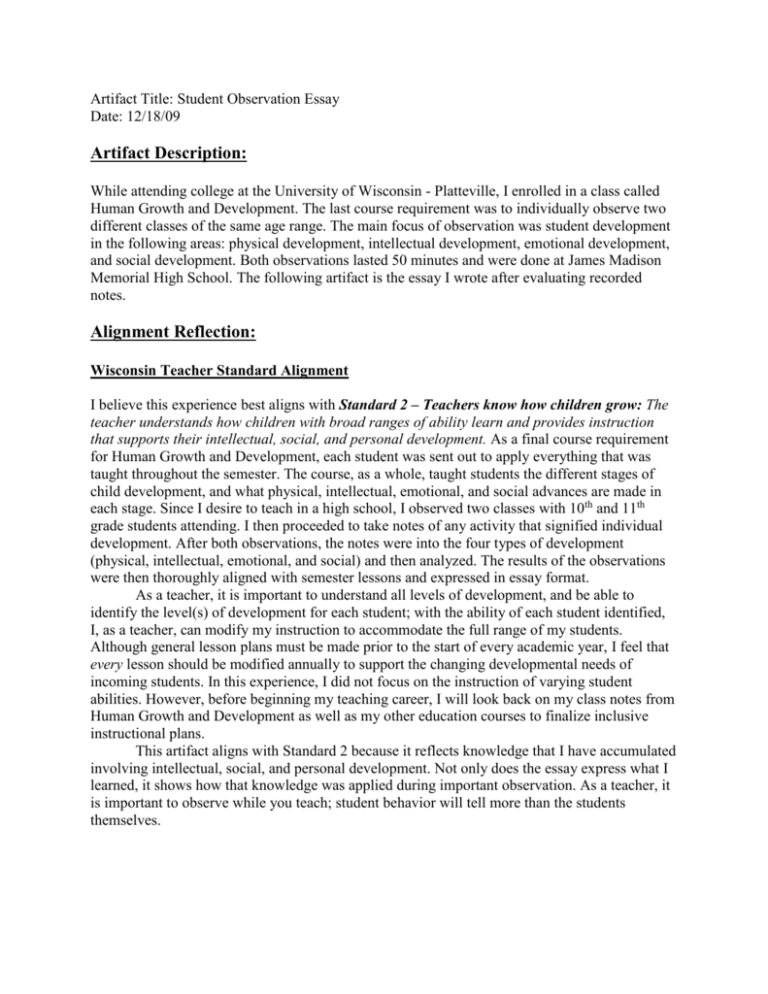
Artifact Title: Student Observation Essay Date: 12/18/09 Artifact Description: While attending college at the University of Wisconsin - Platteville, I enrolled in a class called Human Growth and Development. The last course requirement was to individually observe two different classes of the same age range. The main focus of observation was student development in the following areas: physical development, intellectual development, emotional development, and social development. Both observations lasted 50 minutes and were done at James Madison Memorial High School. The following artifact is the essay I wrote after evaluating recorded notes. Alignment Reflection: Wisconsin Teacher Standard Alignment I believe this experience best aligns with Standard 2 – Teachers know how children grow: The teacher understands how children with broad ranges of ability learn and provides instruction that supports their intellectual, social, and personal development. As a final course requirement for Human Growth and Development, each student was sent out to apply everything that was taught throughout the semester. The course, as a whole, taught students the different stages of child development, and what physical, intellectual, emotional, and social advances are made in each stage. Since I desire to teach in a high school, I observed two classes with 10th and 11th grade students attending. I then proceeded to take notes of any activity that signified individual development. After both observations, the notes were into the four types of development (physical, intellectual, emotional, and social) and then analyzed. The results of the observations were then thoroughly aligned with semester lessons and expressed in essay format. As a teacher, it is important to understand all levels of development, and be able to identify the level(s) of development for each student; with the ability of each student identified, I, as a teacher, can modify my instruction to accommodate the full range of my students. Although general lesson plans must be made prior to the start of every academic year, I feel that every lesson should be modified annually to support the changing developmental needs of incoming students. In this experience, I did not focus on the instruction of varying student abilities. However, before beginning my teaching career, I will look back on my class notes from Human Growth and Development as well as my other education courses to finalize inclusive instructional plans. This artifact aligns with Standard 2 because it reflects knowledge that I have accumulated involving intellectual, social, and personal development. Not only does the essay express what I learned, it shows how that knowledge was applied during important observation. As a teacher, it is important to observe while you teach; student behavior will tell more than the students themselves. UW – Platteville School or Education Knowledge, Skill, and Disposition Statement Alignment I believe that this experience best addresses KSD1.b. – Demonstrates knowledge of students: The candidate displays knowledge of the typical developmental characteristics, learning styles, skills, interests, developmental backgrounds, and cultural heritages of students and is always aware of the broad ranges and variety present for each of these student characteristics and lifestyles. Through writing the essay from my observations, I displayed knowledge of developmental characteristics and was able to interpret a wide range of student behaviors. I took what I was taught about student behavior and applied it to my in-class observations. Before I could document a behavior, it needed to be clear which class of development the behavior could be classified under. Personal Reflection: What I learned about teaching / learning from this experience Although my observations were restricted to the students, I couldn’t help myself in evaluating the teaching styles of the two high school teachers. In each class, I noticed several occasions of high-level thought questions being asked by the instructors. I also noticed that by asking thought questions, the teachers were able to evaluate student comprehension while encouraging intellectual development. As a future educator, I believe that I can utilize high-level questioning to help identify the current level of my students. In addition to questioning, I feel that early behavioral documentation will help to shape lesson plans for each academic year. What I learned about myself as a prospective educator as a result of this experience/ artifact As a prospective teacher, I learned that it is important to thoroughly understand human development before creating lesson plans. By recognizing the different stages of development, I can better gauge current development standings while adjusting my lesson plan to meet my students’ needs. I also learned that high-level thought questions are great teaching tools, even if asked slightly off topic. When I start teaching, I must remember to think outside the box and encourage my students to do the same.
